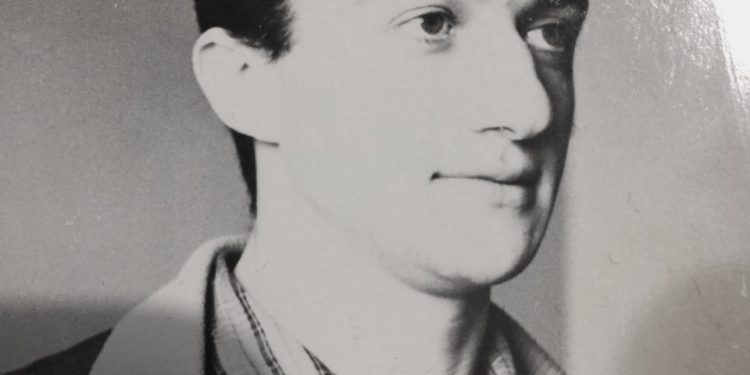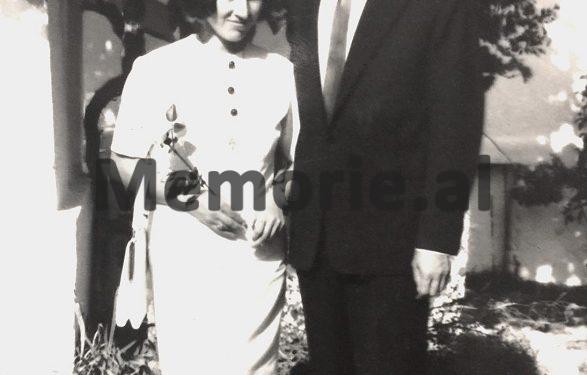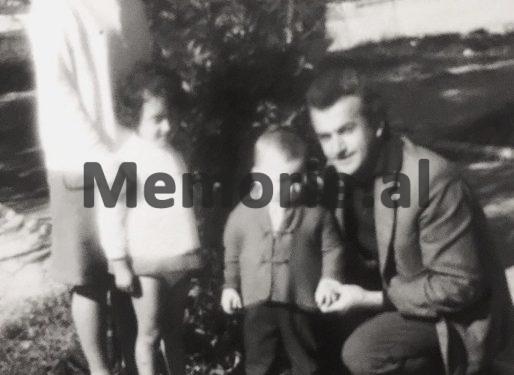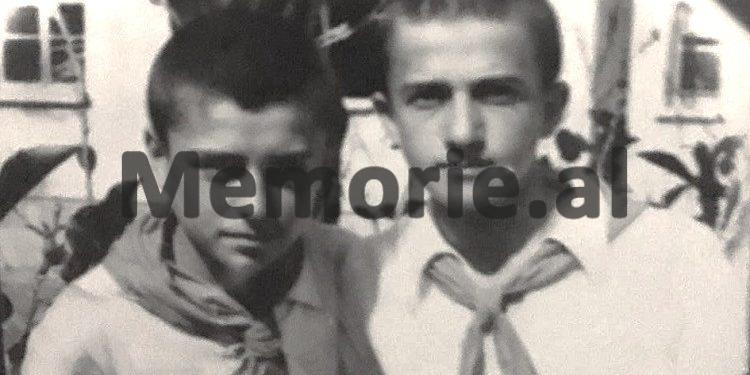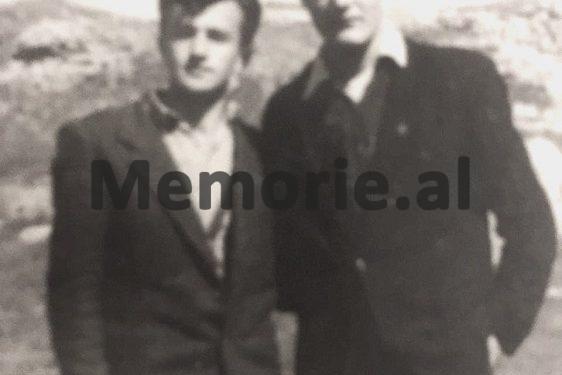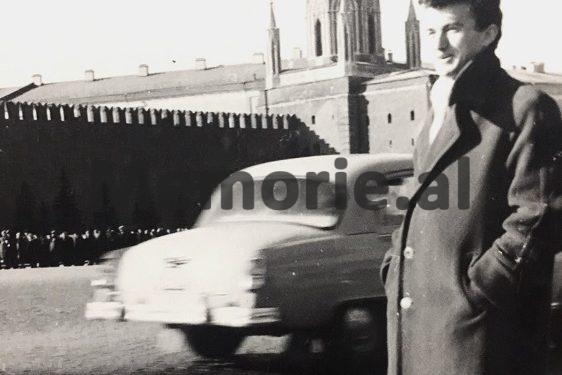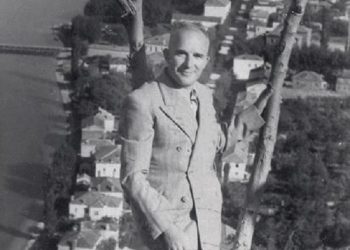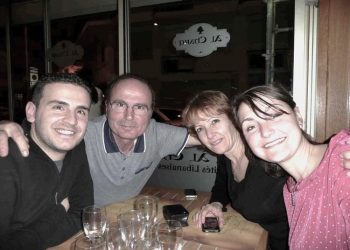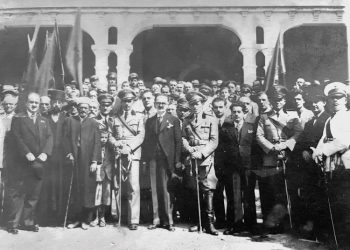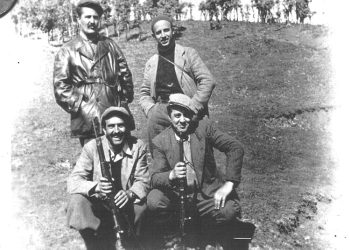By Sokrat Shyti
Part Twenty-Two
Memorie.al / The writer Sokrat Shyti is the “great unknown” who, for several years now, has shown just the tip of the iceberg of his literary creativity. I state this based on the small number of his published books in recent years, mainly the voluminous novel “Nata fantazmë” (Tirana 2014). The novels: “BEYOND THE MYSTERY”, “BETWEEN TEMPTATION AND WHIRLPOOL”, “DIGGING OF NIGHTMARES”, “THE SHADOW OF SHAME AND DEATH”, “THE HEAD-THROWING COLONEL”, “THE DAMP HOPE”, “THE TWISTS OF FATE” I, II, “SURVIVAL IN THE COWSHED”, as well as other works, all novels, ranging from 350 to 550 pages, are in manuscripts waiting to be published. The dreams and early enthusiasm of the young novelist, returning from studies abroad full of energy and love for art and literature, were cut short early on by the harsh blade of communist dictatorship.
Who is Sokrat Shyti?
Returning from studies at the State University of Moscow, shortly after the interruption of Albanian-Soviet relations in 1960, Sokrat Shyti worked at Radio “Diapazon” (which at that time was located on Kavaja street), in an editorial office with his journalist friends – Vangjel Lezho and Fadil Kokomani – both later arrested and subsequently executed by the communist regime. In addition to the radio, the 21-year-old Sokrat, if we imagine him, at that time had passionate literary interests. He wrote his first novel “Madam Doktoresha” and was on the verge of publication, but… alas! Shortly after the arrest of his friends, to fill the cup, a brother of his, a painter, fled abroad.
Sokrat was arrested in September 1963, and in November of that year, he was interned with his family (with his mother and younger sister) in a place between Ardenica and Kolonje of Lushnja. For 27 consecutive years, the family lived in a cow shed made of reeds, without windows, while Sokrat was subjected to forced labor. Throughout those 27 years, he was legally obliged to present himself three times a day to the local authority. He had no right to leave the place of internment, was deprived of any kind of documentation, etc. In these conditions, amidst a cow shed, he gave birth to and raised his children. Precisely from this event, or more accurately, a very long history of persecution, he based his writing of the book “Survival in the Cowshed”!
Agron Tufa
Continued from the previous issue
EXCERPT FROM THE BOOK, “SURVIVAL IN THE COWSHED”
– “Why do you say today that you’re exhausted, my son, after lifting and lowering all that stuff, besides having put it in its places?”… – my mother lamented.
– “Without the help of those two strong boys, I wouldn’t have managed, – I reassured her. – To be completely accurate, they carried all the stuff from the shed to the truck and unloaded it at our house: I only directed the sequence of actions.”
– “Then they must have had a feast for that! – My mother said with a sigh. – When you arranged these big matters, you didn’t bother to say a word to us?!”… – she added with reproach.
– “What could he say when he knew nothing at all? – intervened the master of the house. – Today, an officer from the Internal Affairs called Sokrat for questioning, and they both went by car to Kolonje. The events unfolded thereafter as he explained.”
– “So this great kindness was done by the Internal Affairs?”… – my mother asked, quite astonished and disbelieving.
– “These from the Internal Affairs are intermediaries. The credit goes to the First Secretary of the Party Committee!” – said my sister’s husband with pride, openly expressing his personal satisfaction that finally there was a reconciliation between the ideal and the establishment of a denied justice, which he had sought for a long time, especially during these three years following the terrible sentence of his mother-in-law, brother-in-law, and sister-in-law, as it seemed horrific and inhumane to punish the innocent members of a family just because one of them had a bad reputation!
As soon as he arrived home, Arqelin excitedly told his mother all the details of the event, without worrying whether she would listen with curiosity or with a headache, and perhaps she would wait, annoyed, for her daughter to put an end to this meaningless story. Indeed, when she saw that her daughter continued to ramble on and had no intention to stop, she interrupted her in a raised tone saying:
– “Today your mind seems completely gone! Even if you had your dear husband here, you wouldn’t be so beside yourself with joy!”
– “So according to you, I don’t have him?… Then you must not have heard when I told everyone, without hesitation or a hint of doubt, that apart from Sokrat, I won’t consider any other man, be he a prince or a star on his forehead!” – The daughter replied, heatedly.
– “You spoke it out loud, and everyone heard, but no one believed you because we knew you were madly in love. You’ll remember my words later when you face the difficulties of life. Then you’ll see I was right.”
– “Forget that thought! And mind your own business, because you won’t hear any complaints from me! – Arqelin promised. – Not only now that I’ve settled into a proper home, but even if I were to remain in the shed, I wouldn’t change my conviction!”
– “Then you’ve completely lost your mind!”… – said the astonished mother.
– “Call me what you want; I’m not offended by your insults, – Arqelin replied angrily. – But know this: when my fiancé comes here, he will light up the whole house, even more than the gloomy candle! The fiercest opponents will lose their faces!”
– “When has your tongue become so quickly and lively, when you’ve always been silent?” … – chastised her mother, Ulë.
– “Mom, you’re wasting your energy and getting upset for nothing. I tell you with complete certainty: my Sokrat will soon enter your heart!” … – the daughter tried to calm her.
– “This is the first time I hear you speak with such determination!” – said mother Ulë with a reproachful gaze.
– “And don’t you understand where this determination comes from?”…
– “The time has come for your daughter to get engaged to that boy, whom she loves more than herself; that is why the stubbornness reveals its true strength. There is a big difference between engagements and marriages based on love, compared to ordinary pairings,” – Arqelin emphasized with pride.
– “That’s why it is rightly said: not all couples are blessed with love…” – she added, pleased.
– “So we, your parents, who raised you and brought you joy, are beating water in a mortar, since you have made your decision definitively?!” – said mother Ulë nervously.
– “Don’t get upset and don’t be surprised, for I didn’t keep it hidden; I told you from the beginning,” – Arqelin replied. – “Even if the topic of engagement had not come up, one day I would have expressed my inner spiritual desire…”
– “What caused this damned theatre that you met Ana’s son and fell in love with him…” – mother Ulë said with a notable complaint.
– “Your concern is not with Ana or her son, but with the political circumstances of their family. That’s why you see my relationship with Sokrat through this veil, without understanding and accepting the truth. I am surprised at you for not considering the truth: if the tremors of the earthquake had not displaced them from Tirana to the district of Lushnja, neither we nor they would have thought of establishing a relationship.”
– “Forget the nonsense and answer my question: does it not bother you at all that you will live in the village?”
– “For me, what matters is the person, the character of the man I love. If a woman’s fate is illuminated by the North Star, she can live even on the mountaintop. After all, Kolonje resembles a neighborhood of the city. Whenever I miss you, I’ll take the bus, we’ll hug and kiss! I’m not going to a faraway exile.”
– “I would never believe that my second daughter, so gentle, nice, obedient, and respectful, would become as stubborn as a mule, and to protect her love, she would go against everyone!”… – said mother Ulë, sighing.
– “I’m the one who is amazed by your unjust stance, especially my mother’s. Instead of supporting me as a mother, you’ve become an opponent! Tell me openly if you have any grievances against Sokrat and his family?! Surely you do not. He is mentioned among the most honorable families, and her son has always shone! I don’t say this just myself, but everyone who knows it agrees. Therefore, let’s put a lid on this discussion and talk as mother and daughter about the engagement.”
Because the longer we delay, the more we leave room for whispers and gossip to spread up and down. At the very least, you should understand that neither I nor he is a nun or monk, and as such, we are not allowed to see or meet. Therefore, discuss again calmly with the family council, tell them all my thoughts openly, without adding any speculation or hope of your own, so that I don’t change my mind. Because, after all, no matter how much you oppose, I will get engaged to Sokrat!”
The next day, Arqelin thoroughly explained to me the heated conversation with her mother and asked me to find a suitable moment to clarify to Ana, our relationship, to remove the only existing obstacle, the old custom, according to which the sister must be engaged first, and then the brother.
– “Aside from this condition, I don’t believe there will be any other obstacles…” – she emphasized confidently. – “Meanwhile, we must keep in mind that delaying harms us; it gives our opponents the opportunity to concoct all sorts of treacherous tricks, because there will definitely be sneaky attacks and unexpected interventions.”
Only by making the engagement a done deal do we obliterate their malicious intentions, break the spider webs, and gain the support of society. We must use the powerful backing of the senior leader of the district to our advantage.
Her reasoning seemed right and expressed at the right time. Certainly, she was in a much more difficult situation compared to me because the whole family and relatives had launched a frontal attack against her. Arqelin had no support: everyone insisted she should give up this madness, which would have terribly severe consequences, explaining that the passion of love runs dry one day and their life would inevitably turn into a frightening desert!
In fact, some amplified their fear to horrifying dimensions, claiming that the engagement and marriage of the daughter of the house to a declassee boy (regardless of the fact that he was once an outstanding pioneer, a group leader in elementary school, one of the best in high school, a valued student at university, and came from a respected family background) could affect the fiancée or his wife, moving her from work or downgrading her from a teacher to a kindergarten educator or child care worker!
These statements were not just mere speculation or empty fabrications. Some childhood friends had told me that the secretary of the Youth Committee of the district called Arqelin separately to his office, specifically to pressure her, stating that after the rumored engagement, measures would be taken against her; first, she would be dismissed from her position as secretary for youth and a member of the bureau. But the more concerning assumption was that she could be removed from education, which represented a very serious obstacle. Through this measure, it was highlighted not only that a clear warning was being issued, that she wouldn’t be allowed to transfer to the village as a teacher but also that her continuity as an educator in the city schools was being called into question!
Both of these possibilities served as frightening traps: “Don’t take the step of engagement; otherwise you will be left with nothing and no economic income!” But these real oppositions (even though I didn’t mention them to avoid offending her and having her misunderstand them as a justification, which would burden her psyche) got me moving: I set myself the task of clarifying the doubts with reliable sources. Meanwhile, I promised her that soon I would talk to my mother, so that we could then prepare for the first important step, the engagement.
I had thought to meet with the assistant of the First Secretary of the Party Committee, the only one who could clarify the speculations or dismiss them entirely. So, I took courage and climbed the stairs of the Party Committee building: I told the service worker that I had an appointment with comrade Qemal’s assistant, convinced that he would see me. And so it turned out. He was quite polite and willing to clarify my concerns.
In fact, he did not hesitate to push the meeting to another convenient hour when he would be alone in the office, considering that during the presence of the boss, it was almost impossible to focus entirely on the request of the needy. Just at that moment, the intermediary door of the office opened unexpectedly, and the big boss appeared in the doorway, a pleasant-looking average-height man, dressed in a chocolate-colored suit, with a white shirt and a beige tie.
– “Are you busy?” – He kindly asked his assistant, who had risen to his feet and was waiting for the boss’s order.
– “I was clarifying Sokrat about some inaccurate whispers that had rightly troubled him,” – replied the assistant.
– “Good thing you came,” – the big boss addressed me. – “Tell the secretary to prepare us two coffees, as we will exchange a few words with Sokrat about literature and art.”
The assistant’s eyes lit up with joy as the big boss was willing to dedicate a few minutes to me. I entered the luxurious office filled with emotions, because I found myself all alone with my benefactor, who used human logic and the strength of supreme authority to turn the fate of the family 360 degrees, from the hellish shed to a home with normal conditions, like most of the residents of the village of Kolonje!
– “Yesterday, I was on duty in Tirana, and by sheer chance, I met in the bar of ‘Dajti’ hotel, my friend and your supporter, the writer Shevqet Musaraj,” – began the conversation with comrade Qemal after we settled in the waiting corner. – “I feel pleasure every time I see and talk to this noble man, who is extremely modest about what he has done for our country during the War and the years after liberation! You rarely find intellectuals like him, who always speaks of others and never of himself.”
– “Allow me to mention a fact, comrade Qemal!” – I dared to interrupt.
– “It surely must be related to our mutual friend,” – he added with an expectant look.
– “I will never forget for my entire life, and I will always remember his noble gesture: after three months of living in the cow shed, he stopped his car at the bend of Ardenica and asked to meet me! This scene, I will not only mention as long as I live, but if I can, I will leave it in my writings!” … (In the end, my words came out trembling and my eyes filled with tears!).
– “He has a great spirit and a rainbow vision!” – Comrade Qemal emphasized affectionately. – “Albania needs as many intellectuals with such sensitive hearts who see the future through an enlightened prism. I was also shaken by his statement when he told me: ‘I feel guilty that I couldn’t help that talented young man!’ I have never heard such a harsh self-reproach as this! And what impressed me the most was that he expressed it before me with such intelligence! Instead of saying directly: take care of that boy, protect him from the hyenas! He blamed himself.”
Just as you cannot forget the surprising meeting with the General Secretary of the Writers’ Union, which took place after three months of internment, and seemed like a beautiful dream, the brilliant regret of his statement will also remain indelible in my memory. He almost said to me: “If you can, hug her on my behalf, since my health and circumstances are preventing me!” It was one of those rare wonderful meetings that happen once in a while! Just today, I intended to summon you here to share two pieces of good news: the first was Shevqet’s testament, which you heard. I will share the second shortly. The moment I opened the door, I intended to tell the assistant to inform you to come here!
But I direct a specific question to you and I want an accurate answer: what has soured your relationship with the Writers’ Union?”
I was so surprised that I was stunned and didn’t know what to say.
– “To make the question simpler and more direct, but rephrasing it slightly: have you analyzed within yourself why your name has aroused jealousy and ambition within the Writers’ Union?” – added the big boss, with a scrutinizing gaze.
This probing at the most critical point shook me, touching the very core of my thoughts, and made me quite careful in this important dialogue.
– “I understand what worries you and why you hesitate to express yourself freely before me regarding a matter that is quite delicate and essential. But you need to free yourself from them. Because with my public intervention, I have now become part of your personal and family troubles…” – he emphasized in a caring tone. “First, let me express…”
– “That comes last,” – interrupted the big boss. – “Of course, my assistant has informed you about what needs to be corrected. What we have in our hands, we will definitely fix. What concerns me is the root of the issue, where the wild starting point of the Government Commission’s internment-deportation decision originated from?! In Tirana, I spoke with two members of the Commission, my comrades, but I received no clarifying answer. They only said this about the case in question: the decision had no specific details. In every decision, they emphasized, the legal reasoning is written (the law number, articles) and in which district it is applied.”
They didn’t know what explanation to give you for why your family ended up in the forest guard’s cow shed in the village of Ardenica, considering that the truck didn’t stop at any of the collection points, and from there, it received the strange order to continue its journey. So, from departure to arrival, there was no stop whatsoever. Precisely within this order, one must undoubtedly hide someone’s influence and cruelty. Since this action remains even today a mystery without a legal explanation, malicious speculations inevitably come into play.
The fact that you, as a simple journalist at the Radio, have not had the chance to interview any high officials in important departments negates the speculation that you might have stepped on someone’s toes. This fact is compounded by your exemplary behavior and stance at work. Moreover, being a calm and quiet nature, not explosive, excludes your participation in heated political debates. These statements are also confirmed by the records of the trial against journalists: your name is not mentioned in any line, even though you worked in an office with Vangjel Lezho. All of this paints a completely clean picture of you, without any stain.
Meanwhile, the surprising acquaintance with the General Secretary of the Writers’ Union, his willingness to help you (after being convinced that you possess the ability of an outstanding prose writer, despite your young age, and expressing this with an official statement directed to the First Deputy Minister of Education), especially the quite meaningful indicator that your satirical novel ‘Madam Doktoresha’, written at the age of 21, has instinctively sparked jealousy among one or several pampered ambitious individuals, who have made efforts for your name to be left in complete oblivion and then completely erased. This is also evidenced by the circulation in the void of the manuscript of the novel or the mutilated publication of the long story ‘Teto Maga’, in the magazine ‘Nëntori’, only the first part, without editorial notes!
I was listening with extraordinary attention and much astonishment. I would never have believed that the big boss of the Party in the district of Lushnja had shown such detailed interest in me in all aspects! First, this evidence proved his maturity and sound judgment as a leader with clear human goals. It still seemed to me like a dream that his inquiry and depth extended to the most necessary details, before making the shocking decision, thanks to which the cruel form of revenge was replaced with a considerably softened stance, which enabled survival! Otherwise, if the rhythm of daily gnawing continued, it would bring about some of the most terrifying and destructive consequences! Memorie.al
Continued in the next issue
Copyright©“Memorie.al”
All rights to this material are exclusively and irrevocably owned by “Memorie.al”, in accordance with Law No. 35/2016 “On Author’s Rights and Related Rights”. It is strictly prohibited to copy, publish, distribute, or transfer this material without the authorization of “Memorie.al”; otherwise, any violator will be held liable under Article 179 of Law 35/2016.




